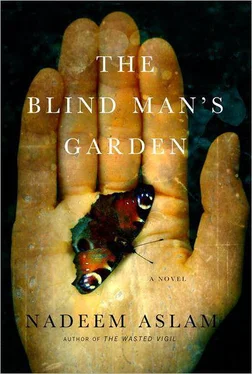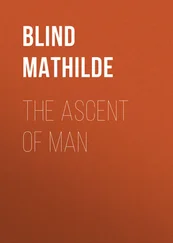‘I’ll come to your hospital late in the morning. Leave the maps with me until then.’
‘We’ll have to visit a bazaar quickly to buy a satellite phone, so I can call home from Afghanistan and pretend I am calling from Peshawar.’
Jeo turns to go and he, with a small touch under his arm where the Beretta sits in the holster, says, ‘Jeo, yes I do have one.’
After Jeo leaves he lights a cigarette and smokes it, exhaling out of the window. He picks the lock of a cabin in the adjoining carriage and slides in, moving through its pitch-dark interior, guiding himself with his hands held out like a blind man, towards the mass of plastic lilies he had glimpsed being taken into the cabin earlier in the evening. Two stations along, the son of a feudal lord is getting married and the family has been visiting nearby towns to buy flowers. If they had been real Mikal would have moved by scent. Musk, cinnamon, river-mud, ether, blood, monsoon moss. They grow in Rohan’s garden and he takes out one flower from each bundle and returns to the window in the corridor, holding the white cluster of them against his body — an obligatory tithe. Out there is the cyclorama of night and each time the train passes a shanty or a hut he throws one of the large white blooms in its direction, whipping his head to look back as it arrives and sticks in the rotting thatched roof or in the jute sack and cardboard that serve as a wall.
He comes back to his seat and closes his eyes. The afternoon he approached Naheed for the first time — to hand her the first ever letter — she had been waiting for a rickshaw in the shade of a tree. And he had entered that shade, a pattern of leaf-shadow covering them both, but had then stepped back into open sunlight and had even turned the peak of his baseball cap backwards, bringing his features in full view.
The train tracks curve under him and there is a swing of gravity in the blood.
One day — after they had been exchanging letters and meeting in secret for six weeks — she mentioned the beauty of a neighbourhood boy and then quickly offered something like an apology, in case his pride was injured. But he had just shrugged.
‘But then I am sure you look at other girls,’ she said.
He had shaken his head.
‘That means you love me more than I love you.’
‘I know.’
The revelation seemed to strike her almost with a physical force. ‘And it is not a problem?’
‘No. I am grateful that you love someone like me at all.’
She said that it was after that conversation that she had fallen in love with him completely.
He opens his eyes and looks into the darkness, pulling his jacket around him tighter against the cold.
What was he doing in the mountains? By the age of thirteen he had begun to play truant, sneaking onto any bus out of Heer that he could, ending up halfway to Karachi or at the base of K2, wandering with a band of itinerant singers in Southern Punjab and climbing into cinema halls through the roofs, surviving in the Baluchi desert by drinking water from wells dug by smugglers.
Rohan would implore him to say what was wrong, what might be done to make him remain at home, and he followed Mikal one morning when he was fifteen years old and discovered that he had found work as a car mechanic. He would not reveal why he needed the money, where he spent some of his nights, and everyone feared the possibility of heroin or the jihad in Kashmir.
The money was of course for the room he was renting, the high room with the pictures on the walls, with doves and wood pigeons as his immediate companions, in the dilapidated century-old neighbourhood where more than half the lanes had dead ends. Avoided by outsiders because it was where domestic servants and day labourers had their homes, eunuchs and wedding entertainers, beggars and rag pickers, and by implication thieves and prostitutes and other criminals.
‘What is the meaning of this?’ his brother Basie asked, having tracked him down to the room one day.
‘I don’t know,’ Mikal remembers saying, the eyes stinging suddenly. He had hidden his face and begun to weep in the manner of very young children and infants — humans before they have learned language.
Basie came forward and collected him in his arms. That room was where both Basie and Mikal were born, where the Communist comrades of their father and mother had come for meetings, and from where the father was taken away by the agents of the government aligned with the United States, the enemy of Communism.
As he dreamed of a revolution, their father had seen no need to make provision for the family, allaying their mother’s and his own occasional doubts by saying, ‘We don’t need to worry about the future of these two. By the time they are adults, life’s basic necessities will be free for everyone. There will be no personal wealth and these boys will be equals among equals. Let’s concentrate on bringing about that state of affairs.’
Mikal more or less moved out of Rohan’s house at seventeen and began to live in the room, the others coming to visit him as much as possible. Being eight years older than Mikal, Basie had deeper and more vivid memories of their mother, while Mikal hadn’t known their father at all.
Basie would lie on the mattress and talk endlessly, sometimes drinking from a bottle of Murree’s whisky he’d bring with him, bought from one of the clandestine bars in Heer where there were locked cages for female drinkers, to prevent them from being sexually assaulted by the inebriated male clientele, as well as to stop the drunk women from killing every man in sight. According to Basie, his smart brother, full of gregariousness and laughter most of the time, with a good-natured swear word in every fifteenth sentence.
‘I think he’s alive,’ Mikal said to Basie once when the bottle of Murree’s was nearly empty.
‘No. He was tortured to death, most probably in the dungeons of Lahore Fort.’ Basie opened his eyes. ‘Is that what this is about? You wanted to come back here to wait for him.’
‘I don’t know.’
Basie would go back to Rohan’s house — having failed yet again to persuade him to return with him, or he would stay with Mikal for days at a time.
Terrified of darkness Mikal never switched off the lights when he slept, and each week he put into a box the money he earned, not knowing what to do with it beyond the few essential needs, holding the meaningless pile of it in his hands one day and looking around at the walls of the empty room. He had placed it in a bowl in the middle of the floor and set it on fire, reducing it all to ash.
He saw her near Rohan’s house when he was eighteen, the girl with the serene yellow gaze. He noticed her more and more after that and she was too beautiful for him to think about without suffering, but then one afternoon she had held his gaze. The smile was brief. Nothing when seen, everything when contemplated.
*
Something in the train’s motion as it moves through the night awakens Rohan and he turns on the small light above his head. Jeo is asleep on the upper bunk — the light shines down at Rohan from directly beneath the boy’s chest.
Sometimes he feared he was distant from Jeo in his childhood, the boy’s existence a trial for him, a constant reminder of his loss, and he remembers asking him one day, ‘Do you know I love you?’
Jeo must have been about four years old and he had dismayed Rohan by shaking his head.
‘You don’t?’
‘No.’ Then the child began to look carefully at his face, even raising his hands to touch the features. ‘How do you know if someone loves you?’
He thought it might be an observable mark or seal. Something he had missed.
Jeo’s arm is hanging out beyond the edge of the bunk and swaying in the air, and Rohan turns the hand gently to look at the wristwatch. It’s almost 4 a.m. Rohan should get up and read a chapter of the Koran for the repose of Sofia’s soul.
Читать дальше












